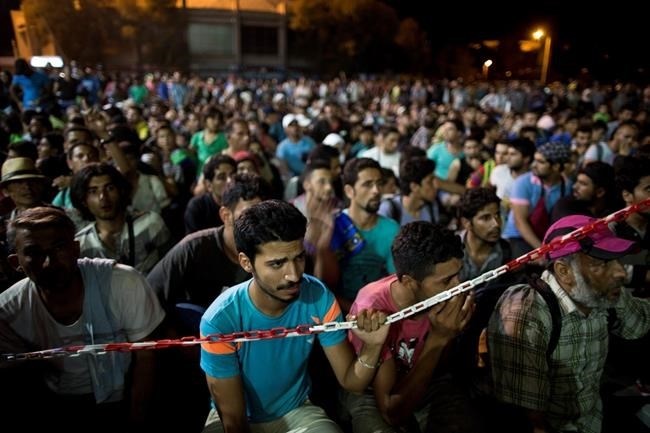
FILE PHOTO Syrian refugees wait at the port of Lesbos island, Greece, to board a ferry travelling to Athens, on Monday, Sept. 7, 2015.
Image Credit: THE CANADIAN PRESS/AP/Petros Giannakouris
July 17, 2016 - 9:00 PM
OTTAWA - This fall, federal public servants are expected to go to Northern Iraq to figure out how to get hundreds of people from there to Canada as refugees.
It's the first time Canadian staff will go to Erbil, the capital of Iraqi Kurdistan, expressly for that purpose.
Private sponsorship groups and the government have been trying to find a way to get refugees out of the area for months, but have been stymied by a lack of Canadian resources on the ground.
That the Immigration Department is sending in a team is one result of ongoing political pressure on the Liberal government to continue a flat-out push to resettle refugees in the spirit of the program that saw 25,000 Syrians brought to Canada in a matter of months.
This week, the House of Commons immigration committee will apply more pressure.
They're holding an unprecedented series of summer meetings examining how to use immigration policy to help anyone, not just refugees, displaced by conflict come to Canada.
The fact there are few legal avenues beyond private sponsorship for those fleeing conflict to immigrate to Canada on humanitarian grounds is a quirk of United Nations definitions around refugees and displaced people and a resettlement policy that dates back to 1951, said Borys Wrzesnewskyj, the Liberal chair of the committee.
But a sizable number of people don't fit those categories, he said.
"We can't stand by and wring our hands in angst and say well, it doesn't fit," he said.
"Let's find ways we can provide a framework to provide sanctuary to these people in Canada."
Amnesty International Canada's refugee coordinator, Gloria Nafziger, said she welcomes the study, though is confused by it.
Only a fraction of a fraction of the world's refugees in need of resettlement ever get it, she pointed out.
"It's good that we recognize that many internally displaced people are in refugee-like situations, they just haven't been able for many, many reasons to cross the border and seek protection," she said.
"But kind of finding a solution to that or looking at solutions to that when we haven't really been able to find solutions to refugees that cross borders, it's just puzzling to me."
The study has its roots in Opposition Conservative MP Michelle Rempel's desire to accelerate efforts to resettle Yazidis, an ethnically Kurdish minority group whose treatment at the hands of Islamic militants was termed a genocide by the UN last month.
Some Yazidis are in Turkey, where private sponsors are up against the Turkish government's notoriously slow approvals process for exit permits. The failed coup of the last few days is likely to make matters worse.
But most Yazidis are in northern Iraq, and since that's their home country, the UN won't refer them to countries like Canada for resettlement.
The Tories argue that the plight of the Yazidis is so severe that the Liberals should specifically ask the UN to help get them out. The team headed to Erbil in the fall is only processing existing applications.
The government has so far resisted those calls. The Liberals also resisted pressure from the Conservatives to label the acts of torture, sexual slavery, forced conversions and killings of Yazidis as a genocide, agreeing only after the UN report was released.
But they pushed back against Rempel's desire to have the committee study Yazidis alone.
So MPs hear about other groups as well, including Sikhs in Afghanistan and the situation in South Sudan where renewed fighting in recent weeks has sparked concern for that region's displaced populations.
Rempel said the Liberals are refusing to yield on the Yazidis because of refugee policy under the prior Conservative government that did focus on religious minorities. She said she hopes the hearings this week help change their minds.
"There are complex policy responses but then there's also low hanging fruit, like lifting the cap on privately sponsored refugees from Iraq," she said.
"This doesn't have to be left versus right or blue versus red, these are complementary policies the government is turning their back on because it's something we have done."
News from © The Canadian Press, 2016